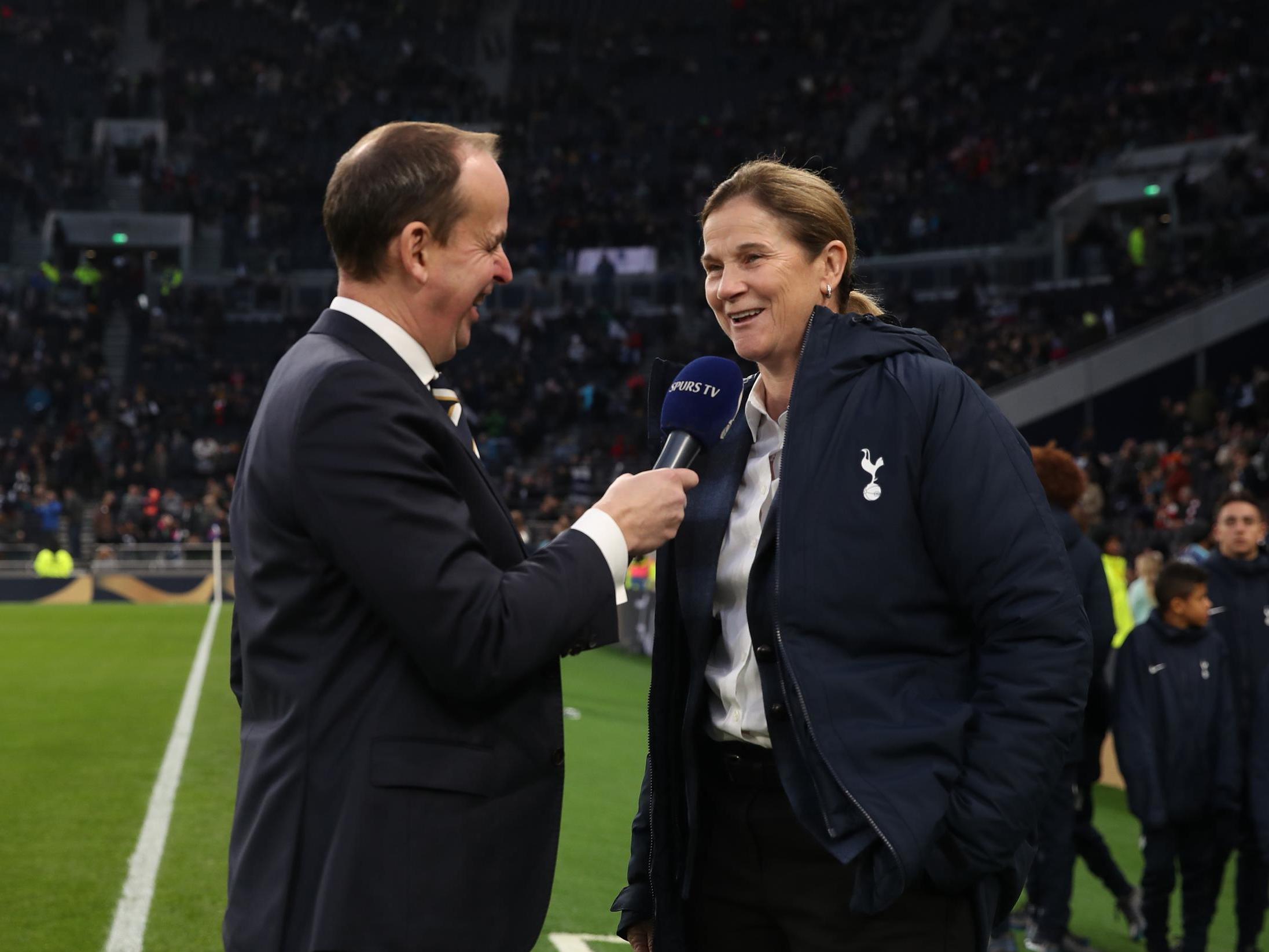‘There’s no piece of the job I don’t miss’: The Premier League’s matchday voices longing for the mic
Premier League stadium announcers form a key part of the matchday soundtrack. Melissa Reddy spoke to four recognisable voices about not having microphones in their hand and the roar of the crowd in reaction


Almost as if he's flicked a switch mid-conversation, Graeme White’s voice suddenly ratchets up.
“Welcome to Goodison for our Premier League game against…” he says, with the power to mentally teleport you to a seat inside the storied stadium.
“The thought of those words coming out of my mouth again, that is what is keeping me going. I’m waiting on that day. When it happens, I’m going to savour and appreciate every second of the experience.”
Between August and May each year, White is part of the soundtrack to Everton’s home games. Like stadium announcers around the country, he is entwined in matchday coverage as both a source of information and a contributor to the atmosphere.
And just like his colleagues, he feels somewhat lost without the rush of reading out the teams before kick-off or relaying that a goal has been scored by the hosts.
Elite football in England has been suspended indefinitely since 13 March on account of the coronavirus pandemic. With the game only able to return when it is safe to do so - almost certainly behind closed doors - it will be a while before their voices help shape fixtures in the ground again.
“It’s been so strange without it all,” says White, who started out at Everton's radio station in 1995. “It starts in the build-up to the match when you’re having a debate with people in supermarkets or on social media about what’s going to happen, where the key battles will be on the pitch…
“The night before the game, I do my research and practice opposition player names. Then it’s the ritual of waking up and getting my suit ready, putting my lucky socks on and heading to the ground and seeing the crowd build-up.
“There's no better feeling than when Everton score and hopefully that comes across as I make the goal the announcement cause I’m internally going ‘yessss.’ When the opposition score, it's muted and matter of fact. There’s no piece of the job I don’t miss.”
Emma Saunders, a Watford season-ticket holder from the age of eight, is the barrier-breaking voice that illuminates the PA system at Vicarage Road.
“The reality of lockdown is that we realise how much of our lives we took for granted,” she says. “At Watford, everyone feels like part of a big family and we are missing each other.
"Personally, I miss everything about being at Vicarage Road – that final team sheet read before kick-off, the sea of yellow and black, the massed chants of ‘C’mon You Horns...'
“Last Sunday, the Z-cars theme tune Watford's players walk out to was in the music round of an online family quiz via video and it brought a lump to my throat.”
Saunders, who has shattered ceilings in stadium announcing by being the sole lead female on the microphone in the Premier League, enjoyed her earliest matchday experiences with her dad.
He sadly passed away when she was 17, but his passion for Watford still flows through her work.
“There is no other job like it,” Saunders says. “I’ve been doing it for five years now, and it doesn’t lose its buzz. I grew up watching Watford so have experienced enough lows as a supporter over the years to know that your never take the highs for granted – especially with it being so tough this season.
“Nothing confirms that more than our last home game when we unbelievably beat Liverpool 3-0. The euphoria was extraordinary. Just after announcing our third goal, I remember turning to the tunnel stewards next to me in disbelief. With the relegation fight in mind, I squeezed them tight and whispered in their ear 'we must appreciate this moment – take it in!'
“Even three goals up, there were 20 minutes to go and we knew what this Liverpool side was capable of. We obviously held onto the lead and won, but I’m so glad I took that moment to be fully present. None of us had an inkling that would be our last home game for a while – but wow, what a match to bow out on for now!”
Paul Coyte, or ‘that guy at Spurs’, was a cocktail of emotion as he prepped to do Tottenham's half-time entertainment at White Hart Lane for the first time.
“I was so overwhelmed walking on the pitch and seeing myself on the Jumbotron, which looks like an old portable TV compared to the screens in the new stadium,” he says. “I got headrush and honestly thought I would pass out.”
That was incomparable the to the jitters the radio presenter felt on 14 May 2017, when he brought the curtain down on the White Hart Lane era.
Tottenham had outclassed Manchester United 2-1 with goals from Victor Wanyama and Harry Kane to secure their highest league ranking since 1963.
“I was so nervous beforehand, I missed most of the match pacing around the empty offices,” reveals Coyte. “We had an unexpected pitch invasion before the ceremony and I spoke to the fans from the heart to go back to their seats. They responded to that which then calmed me down for the important task ahead.
“To write and deliver the last words ever spoken at White Hart Lane was the biggest buzz and honour that a Spurs fan could have.”
The most recognisable voice in the Premier League can be found over the tannoy at Anfield. George Sephton’s debut as Liverpool’s stadium announcer coincided with Kevin Keegan’s bow for the club against Nottingham Forest in August 1971.
Next season will mark his 50th of being stationed in the room above the scoreboard on the Kop side of the Kenny Dalglish stand.
“I miss the camaraderie and the routine of it,” Sephton says. “The guys in the matchday control room, the VAR operators, the catering people, the security staff who search my laptop bag every game, those who guard the car park… we’re all part of a team.
“I miss their smiling faces. I’m straining at the leash to get back. I hang on every word of every news bulletin – desperate for any chink of light at the end of the tunnel.”
In the absence of matchdays at Vicarage Road, Saunders has been impressed by her club’s community work during the global crisis. “The stadium is focused on giving support to the amazing NHS staff, and in particular, those that are working right next door at Watford General Hospital.
“When you see photos of exhausted NHS staff taking breaks in newly created rest rooms in the hospitality suites overlooking the pitch and hear how the club’s washing machines are being used to launder scrubs, for example, you absolutely realise that football has to take a back seat right now.”
The Premier League have been working through “complex planning scenarios” and “possible scheduling models” for a return to the game when it is deemed medically safe. That is likely to materialise without supporters, which is not an ideal situation but the only feasible solution.
“Football behind closed doors is going to be weird in these difficult times for a whole host of reasons,” Saunders says. “The stadium announcer is there to add to the experience for the fans, so I am sad to think they won’t be there either to enjoy the matches.
“Especially if Watford do pull off Premier League survival… However, half of North London will still be able to hear my voice if Watford stay up as I’ll be cheering at the top of my voice in front of my TV!”
The thought of Liverpool ending a 30-year drought at an empty Anfield pains Sephton, who appreciates that spectator-less matches will be necessary even though they feel soulless.
“I watched a couple of the behind-closed-doors games that were on TV before the lockdown,” he says. “The atmosphere was so sterile, so cold, it was awful.”
Coyte echoes that it will be “a strange situation” and while he’d be happy to have football back on his screen, he’s desperate to return to “everyone enjoying football as we used to. I miss finishing off with ‘Up the Spurs,’ which is a phrase my grandad used to say to me as a boy.”
White circles the thought of that shared experience again too. “People all have their set routines for games. They go to get their pie and chips together at a certain time, head to their seats at a certain time… it’s a sense of comfort and community.
“When I have the mic back in my hand, I’ll be happy because I know this horrible pandemic is gone away and everyone has their matchday rituals to count on again.”
Join our commenting forum
Join thought-provoking conversations, follow other Independent readers and see their replies
Comments
Bookmark popover
Removed from bookmarks